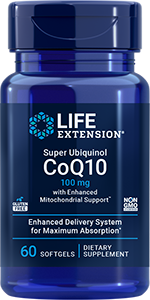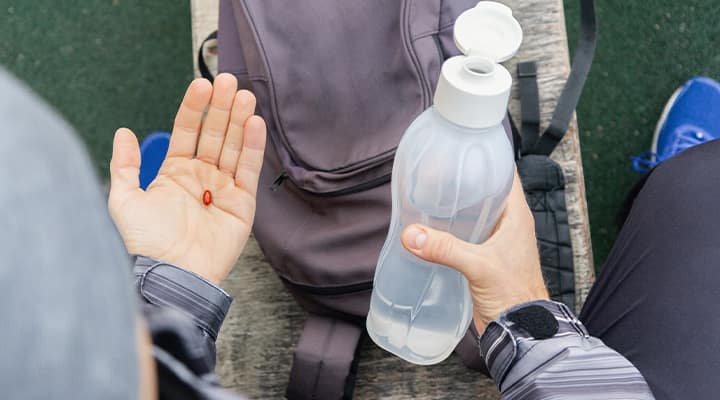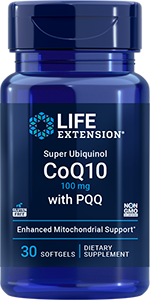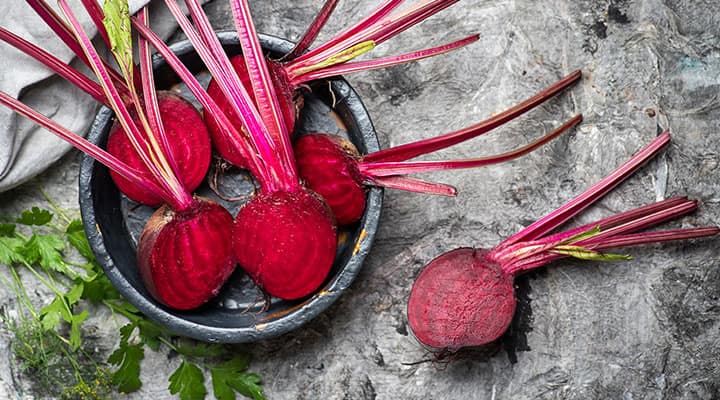
Is CoQ10 an Antioxidant? An Essential Nutrient for Heart Health
Published: July 2024
Coenzyme Q10, more commonly known as CoQ10, exists in your body, and you'll also find it on the shelves of your local health food store. But why should you care about it? Well, for starters, nearly every single cell in your body needs it to function properly! Not only does it support healthy cellular energy levels, but it is also a powerful antioxidant.
So what does that mean for your health? Let's learn more about the many benefits of this coenzyme, and how to effectively incorporate it into your lifestyle through supplements and potentially even food sources.
Is CoQ10 an antioxidant?
Yes! And as an antioxidant, one of CoQ10's main jobs is to protect your body from oxidative stress. This means that it can essentially neutralize free radicals in addition to regenerating other antioxidants your body needs, like vitamins E and C (or α-tocopherol and ascorbate, respectively).
Why do oxidative stress and neutralizing free radicals matter? We're exposed to free radicals almost every day via the ozone layer, cigarette smoke, industrial chemicals, other air pollutants and some places you'd least expect—our own bodies can even create them just through existing.
These free radicals can impact the function of your whole body (from your cell membranes and lipoproteins to your DNA), so antioxidant protection is key to maintaining optimal health.
What are the antioxidant benefits of taking CoQ10?
While, as we said, CoQ10 is an antioxidant, that's not all it is. But one thing at a time!
The antioxidant benefit of taking coenzyme Q10 is that it combats oxidative stress and free radicals to support your overall health. This might sound simple, but it makes for a ripple effect of positive changes in the human body. One key example: antioxidants can support a healthy inflammatory response. They're also good for eye health and heart health—all of which can be negatively impacted by oxidative stress.
The connection between CoQ10 and cardiovascular health in particular is interesting. The highest concentration of this antioxidant is found in the heart, but these levels decrease with age. Age plays a huge role in heart health, especially when you factor in oxidative stress, which can have a negative impact on vasodilation (this is a fancy word for the widening of the blood vessels which allows blood to pass through appropriately). By consistently supplementing with coenzyme Q10 and thus inhibiting oxidative stress in the body, you can encourage healthy cardiovascular function and blood flow.
Other benefits of CoQ10
As we mentioned earlier, CoQ10 isn't powerful merely because it's an oxidative stress fighter, although that's a big reason. It also has plenty of other benefits.
Cellular energy
—Because CoQ10 helps turn food into energy, it contributes to keeping you feeling chipper throughout the day. One study in particular found that after cognitive tasks, levels of fatigue and sleepiness in participants were better. This likely happens because CoQ10 helps metabolize fatty acids, which are energy sources for the body.
Coenzyme Q10 is also an important player in the mitochondria. Mitochondria are cell organelles that are bound by a membrane and are primarily responsible for creating most of the chemical energy that your body needs to power your cells' biochemical reactions.
Explore Our Best CoQ10 Supplements
Heart health
—Yes, we already touched upon the antioxidant benefits of CoQ10 to your heart. But this coenzyme's impact on energy (and thus, high-energy organs) can help your heart keep on ticking.Liver health
—Research shows that supplementing with CoQ10 encourages healthy circulating ALT, AST, and GGT levels. These are all enzymes that are indicative of liver function.Supports a healthy inflammatory response
—Earlier, we touched on how coenzyme Q10 can support a healthy inflammatory response. We want to emphasize how important this is. Encourage a healthy inflammatory response and your whole body will thank you for it.
Is CoQ10 a vitamin?
No. CoQ10 isn't technically a vitamin or an essential nutrient because our bodies can make it. However, don't be mistaken: it's very much essential and plays a key role in maintaining the vital functions of every single cell in your body. That's why, even though we also get some of it through nutrition, many people choose to increase their levels through supplementation of this fat-soluble antioxidant! If you want your cells to have the battery life they need, then you're going to want adequate levels of CoQ10.
What happens when you take CoQ10 every day?
To recap what we've discussed, when you supplement with this coenzyme, a powerful antioxidant, it can help support healthy cells and mitochondria, optimal cardiovascular health, stable liver function and a healthy inflammatory response.
Note that CoQ10 is not something you take on an as-needed basis. You should commit to taking it daily for at least a few weeks. Most people who learn about its incredible power and benefits take it for life!
Should I take CoQ10 in the morning or at night?
First and foremost, you should read the labels of your dietary supplements to see the recommended dosage instructions. Outside of that, the time of day you take CoQ10 comes down to what your healthcare provider tells you or your personal preference. Because coenzyme Q10 supports healthy energy levels, many people like taking it earlier in the day (morning or early afternoon).
However, you should do what makes you feel best. You can still take it at night, as long as you consume it with food—which brings us to our next point.
In terms of how to take it, avoid taking your dosage on an empty stomach. Coenzyme Q10 is fat-soluble, meaning that it dissolves in fat and oil. In other words, you'll want to supplement with food—ideally, something that has a bit more fat in it. This could be a snack that includes cheese or yogurt, salad with dressing made with olive oil, or even fatty fish like salmon.
If you do take it on an empty stomach, not only will it not absorb as well (meaning it won't work as well), but it may be harder to digest for those with sensitive stomachs.
What foods contain CoQ10?
If you want to get more of this coenzyme from your diet, try consuming more meat, fish, nuts and oils. Smaller amounts can be found in most dairy products, fruits, vegetables and cereals. That being said, even these foods are not a significant source of CoQ10. To go beyond what your body produces on its own, you'll need to supplement.
Which type of CoQ10 should I take?
A high-quality CoQ10 supplement can work wonders on your overall wellness. When looking for CoQ10, seek out supplements formulated with ubiquinol, which is a highly bioavailable form of the coenzyme and is better absorbed by the body than standard CoQ10. Ubiquinone is a less expensive option for those on a budget, and while less bioavailable than the reduced ubiquinol form, still confers benefits.
The ubiquinone vs. ubiquinol debate aside, be sure to speak with your healthcare provider before starting any new supplements!
Want to amp up your heart health arsenal and complement your CoQ10? Take our heart health quiz to see what other supplements might be beneficial to your health.
References
- Biswas SK. "Does the Interdependence between Oxidative Stress and Inflammation Explain the Antioxidant Paradox?" Oxidative Medicine and Cellular Longevity. 2016. https://onlinelibrary.wiley.com/doi/pdf/10.1155/2016/5698931
- Damaneh MS, et al. "The effect of coenzyme Q10 supplementation on liver enzymes: A systematic review and meta‐analysis of randomized clinical trials." Food Sci Nutr. September 2023. https://www.ncbi.nlm.nih.gov/pmc/articles/PMC10494615
- Drovandi S, et al. "Oral Coenzyme Q10 supplementation leads to better preservation of kidney function in steroid-resistant nephrotic syndrome due to primary Coenzyme Q10 deficiency." Clinical Investigation. May 2022. https://www.kidney-international.org/article/S0085-2538(22)00379-9/fulltext
- Long YC, Zierath JR. "AMP-activated protein kinase signaling in metabolic regulation." J Clin Invest. July 2006. https://www.ncbi.nlm.nih.gov/pmc/articles/PMC1483147/
- Mizuno K, et al. "Ubiquinol-10 Intake Is Effective in Relieving Mild Fatigue in Healthy Individuals." Nutrients. 2020. https://www.mdpi.com/2072-6643/12/6/1640
- Pravst I, et al. "Coenzyme Q10 contents in foods and fortification strategies." Crit Rev Food Sci Nutr. April 2010. https://pubmed.ncbi.nlm.nih.gov/20301015/
- Rabanal-Ruiz Yoana, et al. "The Use of Coenzyme Q10 in Cardiovascular Diseases." Antioxidants (Basel). May 2021. https://www.ncbi.nlm.nih.gov/pmc/articles/PMC8151454/
- Saini R. "Coenzyme Q10: The essential nutrient." J Pharm Bioallied Sci. July-September 2011. https://www.ncbi.nlm.nih.gov/pmc/articles/PMC3178961/
- Yoo JY, Yum KS. "Effect of Coenzyme Q10 on Insulin Resistance in Korean Patients with Prediabetes: A Pilot Single-Center, Randomized, Double-Blind, Placebo-Controlled Study." Biomed Res Int. 2018. https://www.ncbi.nlm.nih.gov/pmc/articles/PMC6087610/
- "Antioxidant Supplements: What You Need To Know." National Center for Complementary and Integrative Health. July 2023. https://www.nccih.nih.gov/health/antioxidant-supplements-what-you-need-to-know
- "Antioxidants." Harvard T.H. Chan School of Public Health. https://nutritionsource.hsph.harvard.edu/antioxidants/#antioxidants%20benefits
- "Coenzyme Q10." Data on file.
- "Coenzyme Q10." Data on file.
- "Fat-soluble vitamin." National Cancer Institute. https://www.cancer.gov/publications/dictionaries/cancer-terms/def/fat-soluble-vitamin
- "Inflammation." National Institute of Environmental Health Sciences. https://www.niehs.nih.gov/health/topics/conditions/inflammation
- "Mitochondria." National Human Genome Research Institute. July 2024. https://www.genome.gov/genetics-glossary/Mitochondria
- "Oxidative Stress." National Cancer Institute. https://www.cancer.gov/publications/dictionaries/cancer-terms/def/oxidative-stress
- "Proteinuria." Cleveland Clinic. July 2022. https://my.clevelandclinic.org/health/diseases/16428-proteinuria#symptoms-and-causes
- "Vasodilation." Cleveland Clinic. June 2022. https://my.clevelandclinic.org/health/diseases/23352-vasodilation
Always be in the know!
Access the latest deals, wellness news, expert health tips & more!












